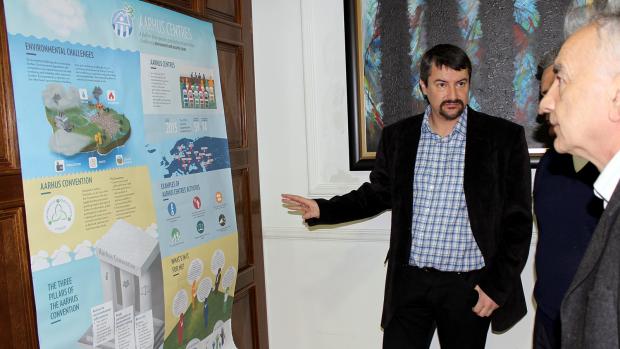Safeguarding the environment in Bosnia and Herzegovina – Aarhus-style
Imagine a large investor coming to your community with plans to build a new factory or a power plant. You can’t ignore your concern for how this investment might impact the quality of your air or the water in your local river. Thankfully, an outlet exists for you to raise this concern and be heard: the Aarhus Center.
Established to promote the implementation of the Aarhus Convention in BiH signed in 2001, the Aarhus Centers are staffed by environmental activists who support citizens’ access to information held by public authorities, and provide free (yes, free!) legal advice on how to exercise their rights in accordance with the law.
The Aarhus centers opened in Sarajevo, Tuzla and Banja Luka in the last few years have provided all citizens with an open line of communication with their governing bodies and the opportunity to involve them in the decision-making that directly impacts their environment and their lives.
Successful environmental advocacy in Banja Luka and Tuzla
Residents of Banja Luka thus far have utilized the Aarhus Centre’s expertise to file over 20 complaints with various governing bodies. In about half of the cases there was a potential environmental threat, according to Viktor Bjelić from the Center for Environment, which hosts the Aarhus Center in Banja Luka.
When we receive a citizen’s complaint we have to verify its validity in the field.
Viktor Bjelić Head of Banja Luka's Aarhus Centre
“When we receive a citizen’s complaint we have to verify its validity in the field,” says Bjelić. “However, if its location is too remote to physically access it, then we rely on information from our volunteers including, for example, photographs and assessment reports.”
The Aarhus Center team then investigates whether or not there was a breach of the Law on Environmental Protection. “Once we establish this we take the case to the next level and request official documentation from the local authorities by referring to the Freedom of Access to Information Act (FOIA),” Bjelić explains. “Sometimes we also initiate legal proceedings.”
FOIA has been an indispensable piece of legislation in ensuring legal accountability. The Banja Luka Center recently won a lawsuit against the Ministry of Industry, Energy and Mining of Republika Srpska after their request for access to concession contracts for the construction of a hydroelectric plant on the Neretva River was declined.
“The Ministry denied our request because the investor did not want to share the contracts,” recalls Bjelić. “They considered them a trade secret. The Ministry breached FOIA by failing to provide us with an explanation as to why they decided to [hide the contracts]. The District Court of Banja Luka ordered the Ministry to annul the decision and issue another one in accordance with FOIA and the Aarhus Convention.”
Aarhus Centre Volunteers get youth on board as they mark Earth Day, Sarajevo, 22 April 2014. (OSCE/V.Pribilovic)
The center in Tuzla has achieved similar success. When the concerned citizens worried that a power plant in nearby Banovići might pollute the reservoir of potable water at Lake Modrac, they approached the Aarhus Centre for help. “We hired a professor to analyze the environmental impact of the plant,” says Džemila Agić of the Center for Ecology that hosts the Aarhus Centar in Tuzla.
“The professor understood the citizens’ fears and prepared comments on the study,” states Agić. “Based on his suggestions we helped write a statement, which the citizens delivered at a public consultation meeting. Later, we learned from the Ministry of Industry, Energy and Mining of Tuzla Canton that they could not believe the quality of comments and were forced to take them seriously.”
The Aarhus Centers have demonstrably improved dialogue between government institutions and the public. “Now we receive invites to discussions regarding the energy commitments of BiH, or ways of reducing air pollution emitted by the four major power plants in BiH. We sit side-by-side with State-level institutions and companies,” says Agić, proudly, pointing out that earning the government’s respect and citizens’ trust is crucial.
A clean environment stands a chance in BiH
The OSCE Mission to BiH played a vital role in establishing the Aarhus Centers and continues to build their capacities with various networking opportunities, projects and regular meetings with other Centers from the region. In June 2015, 13 Aarhus Centers from Albania, BiH, Montenegro and Serbia signed a Joint Declaration on Co-operation, paving the way for a more substantive work on trans-border issues. Today, the Aarhus Center in Sarajevo, formed under an OSCE project in 2012, is a fully independent non-governmental organization, headed by Sabina Jukan.
Over 200 people took part in public hearings in four cities... this vast citizens’ interest indicates growing public awareness in environmental issues...
Sabina Jukan Head of Sarajevo's Aarhus Centre
Jukan reports that citizens from Bihac to Herzegovina endorsed the Center in a very short period of time. “We are proud,” she notes, “to be able to help them with legal advice on dealing with complex environmental cases such as the garbage depot in Livno or the quarry in Posušje, both of which did not have the necessary permits and are hazardous to the environment.”
She also points out that the Center, in addition to playing a role in the production of the Second National Report on Implementation of Aarhus Convention, co-organized a series of public consultation events concerning the adoption of the new Law on Environment Protection together with the Federal Ministry of Environment and Tourism.
“Over 200 people took part in public hearings in four cities, resulting in 400 comments on the new law. This vast citizens’ interest indicates growing public awareness in environmental issues and participation in public decision-making processes,” concludes Jukan.
Citizens of BiH have shown that they care about the future, and that a clean environment does stand a chance.





